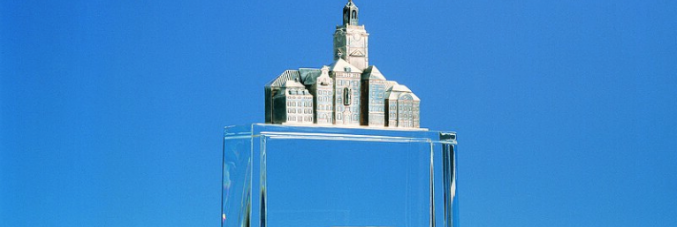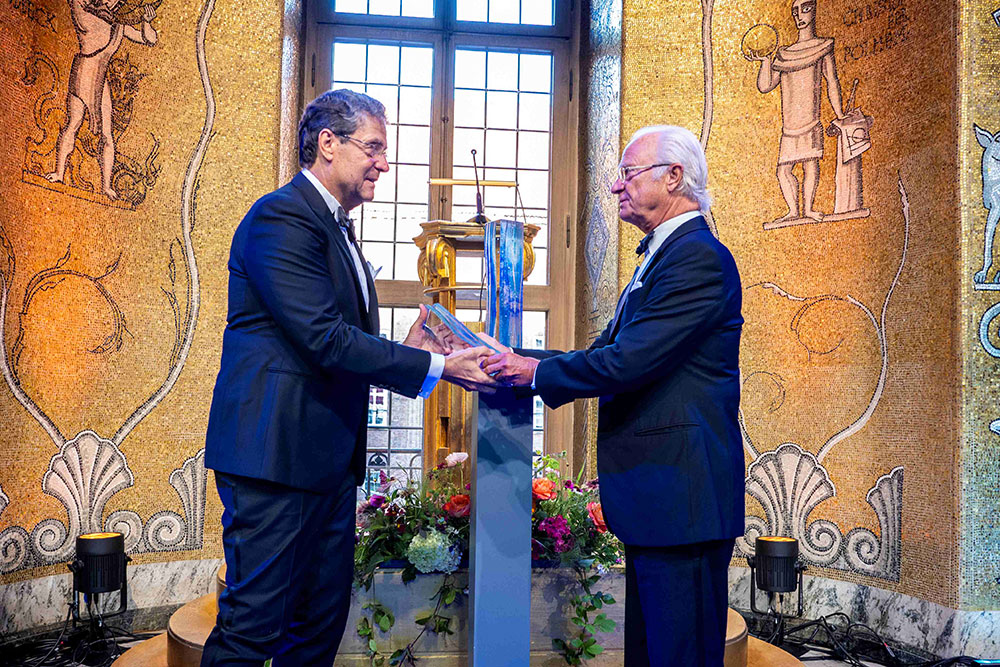
Prof Andrea Rinaldo receives the Stockholm Water Prize at the Royal Academy of Sweden
24.08.2023
Held on 23 August 2023 and hosted in the Gyllene Salen inside Stockholm City Hall, King Carl XVI Gustaf of Sweden presented the Stockholm Water Prize to Prof Andrea Rinaldo of the University of Padua. This is the first time an Italian national has received the honor.
Often described as the Nobel Prize of water due to similarities of its selection process, the Stockholm Water Prize has been awarding individuals and organizations for their outstanding water-related achievements since 1991. The Prize is awarded by SIWI in cooperation with the Royal Swedish Academy of Sciences and presented by H.M King Carl XVI Gustaf of Sweden, who is the official patron of the Prize.
«I am overwhelmed by the events of this evening, as you easily gather – it is a miracle i did not stumble or trip on my way to the podium - proud of receiving this honor following in the footsteps of true heroes of mine. I am grateful for the honor and the privilege i will treasure to have met the king and the royal family, a most gracious one».

Rinaldo goes on to say,
«I very much hope that this first Stockholm water prize attributed to an Italian scientist will inject enthusiasm into a remarkably active and creative water community in Italy. A few deep-seated reflections on the vital role of water seem appropriate in this precious occasion. Wystan Hugh Auden captured its essence as only poets can: “Thousands have lived without love. not one without water”. so hydrology, the science of water, sits at the center of meta-history by virtue of its focus on floods, droughts and a fair distribution of water.
My take is trivial yet heartfelt: climate is changing, rapidly – very rapidly in fact -- and so should we. No privilege, like water supply exceeding current needs, is granted forever. not even in Sweden one may assume that water scarcity or ecosystem services like clean water do not concern them, because the vagaries of nature are erratic and heterogeneous in time and space. this is reminded to us by the relicts of dry riverbeds once teeming with life visible from aerial views in a corner of the Sahel desert where not a drop of rain in 30 plus years has been falling».
«So what can we do to oppose the unforgiving forces of spontaneous evolution when facing global warming and its consequences on water stores and fluxes? Mitigation, solving the root causes, is by sheer necessity top down & fraught with uncertainties and ethical issues (it is hard to tell those who begin to live better to sacrifice hardwon improvements in their quality of life – and hard for the global north of the world to pontificate about the latecoming squandering of natural resources after what it has done to its own – and to others’ – natural capital in the past). Adaptation is instead a bottom up process, keen to a new level of awareness of the rapidity of the climatic change upon us. A new level of civic education is needed to adapt where collective action faces the invisible structures of a landscape.
I believe that time is ripe to rethink the distributive justice of water resources management as the tool to reduce inequalities on a global scale. Today, when i travel in the south of the world, i see that access to safe water distribution networks is socially biased, but the ownership of a cell phone is not. We cannot turn away our head pretending not to see. Inequalities on a grand scale are the engine of migrations and social unrest and indeed water sits firmly at its center. Time to act, promoting broad awareness and interest, is now».



